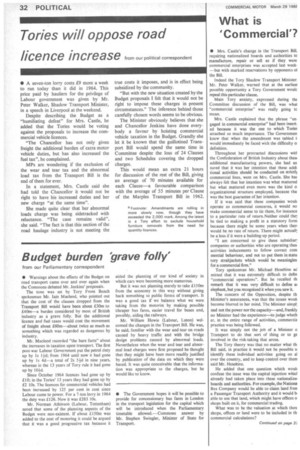Budget burden 'grave folly'
Page 34

If you've noticed an error in this article please click here to report it so we can fix it.
from our Parliamentary correspondent • Warnings about the effects of the Budget on road transport came over and over again when the Commons debated Mr. Jenkins' proposals.
The tone was set by Tory Front Bench spokesman Mr. lain Macleod, who pointed out that the cost of the clauses dropped from the Transport Bill would have been about £30m to £40m—a burden considered by most of British industry as a grave folly. But the additional licence and fuel taxes would cost the movement of freight about £60m—about twice as much as something which was regarded as dangerous by industry.
Mr. Macleod recorded "the bare facts" about the increases in taxation upon transport. The first post-war Labour Government put the petrol duty up by Is 1.+d; from 1964 until now it had gone up by Is 4d—a total of 2s 5+d in nine years, whereas in the 13 years of Tory rule it had gone up by 104{1.
Since October 1964 licences had gone up by £10; in the Tories' 13 years they had gone up by .£2 10s. The licences for commercial vehicles had been increased by 125 per cent in cost since Labour came to power. For a 7-ton lorry in 1964 the duty was £126. Now it was £283 10s.
Mr. Norman Atkinson (Labour, Tottenham) noted that some of the planning aspects of the Budget were non-existent. If about £150m was added to the cost of motoring it could be argued that it was a good progressive tax because it aided the planning of our kind of society in which cars were becoming more numerous.
But it was not planning merely to take £150m from the economy in this way without giving back something to public forms of transport. It was a good tax if we balance what we were taking from the motorist by making possible cheaper bus fares, easier travel for buses and, possibly, aiding the railways.
Mr. William Howie (Labour, Luton) welcomed the changes in the Transport Bill. He was, he said, familiar with the wear and tear on roads caused by heavy traffic and with the bridge design problems caused by abnormal loads. Nevertheless when the wear and tear and abnormal load charges were first proposed he thought that they might have been more readily justified by publication of the data on which they were based. It was quite conceivable that the information was appropriate to the charges, but he would like to know.
























































































































